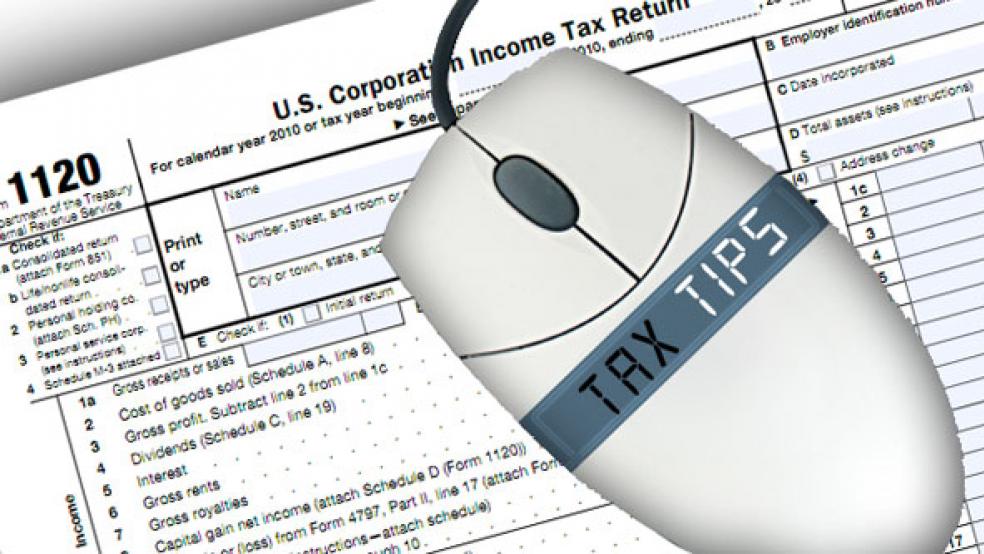You’ve got a month left before the tax deadline — April 17 this year — and have you filed your taxes?
If typical patterns hold, more than one in four of us has yet to sign on the bottom line. IRS numbers show more than 32 million individual income tax returns arrived after April 9 last year.
Preparing your taxes will take you, on average, about 22 hours, according to the IRS.
Naturally you’ve got questions.
RELATED: The 8 Craziest Tax Deductions Approved by the IRS
Here are the five most common questions that have been put to “Ask a CPA” in the last week. A new app for iPhones and iPads, the app has answers to 2,500 tax-time questions, as well as a way to submit a question to a real-life CPA in your area for free. (Seems like a busy time for CPAs to be doing work pro bono, but founder Michael Rosedale, says they see it as a way to generate potential future customers.)
1. Where do I deduct the contributions to a 529 Plan on my federal tax return? Answer: Nowhere. Contributions to a 529 Plan for your child’s education are not deductible on the federal tax return. While some states, such as New York, do allow a state deduction for contributions, the advantage of making contributions to a 529 Plan, says Rosedale, is the fact that the earnings in the plan will not be taxed if the distributions are made for qualified educational purposes. This question is coming up so much, Rosedale suspects the people selling 529 plans are not clearly explaining their true tax benefits.
2. Where do I deduct the $13,000 gift exclusion I gave my grandchild? Answer: You don’t. People misunderstand what the $13,000 gift exclusion represents, Rosedale says. Gifts are not deductible on an income tax return. The $13,000 gift exclusion is the maximum amount you are allowed to give someone without being required to file a gift tax return. But even though you must report gifts above $13,000 on a Form 709, thanks to the Tax Relief Act of 2010 you don’t currently have to pay gift tax on anything under $5,120,000 ($10 million for couples.) That generous upper bar may come down in the future, but the good news is recipients never owe taxes on a gift.
3. Can I deduct the loss on the sale of my home as a capital loss? Answer: Sadly, no. Those with a gain on the sale of their home typically don’t owe tax (see no. 4 below). The flip side of that is that you don’t get a break for losing money on the old homestead either.
4. Can I postpone the tax on the gain on the sale of my home if I buy another house? Answer: If you are single and have lived in your home for two of the last five years, you can exclude up to $250,000 of the gain on its sale from your taxes, whether you buy another house or not. A married couple filing jointly can exclude up to $500,000 of the profit. Any gains that exceed these limits would be taxed at the capital gains rate, currently 15 percent.
5. Why am I subject to the alternative minimum tax? What is it? Answer: In the mid-1980s the alternative minimum tax was introduced to make sure high earners paid their fair share of taxes. Unfortunately over the years, as a result of inflation, more and more individuals are finding they are subject to this tax. The alternative minimum tax is almost like a flat tax in that it strips away the tax deductions one can take. The way it works, technically, is that if the alternative minimum tax calculation, computed on form 6251, results in a higher tax owed than the regular tax computation, then you pay the alternative minimum tax. Certain large deductions may trigger the alternative minimum tax including but not limited to real estate taxes, state and local taxes, interest on home equity loans not used to improve your home, and miscellaneous itemized deductions.
Rosedale says some questions popping up date back to old tax rules long expired. Since the app launched, people with high income one year and low the next have asked whether they can average their tax returns over more than one year, something that hasn’t been allowed since 1984. Question 3 above also has its roots in tax history. Up until 1986 there was a break connected to rolling your gain into another home.
Then there is the category of question Rosedale calls “‘Can I deduct?’ and the answer is ‘no,’” including such non-deductibles as your pet’s medical costs, car loans, credit card balances and the interest on those balances.
As to the universal question of all payers lucky enough to get one — where is my federal refund? — you can visit the IRS’s “Where’s My Refund” website or call (800) 829-1040 or (800) 829 -4477. Be prepared to enter your social security number, your filing status (single, married filing jointly, etc.) as well as the anticipated refund amount.
Though there has been some delay in refunds this year due to technological snafus, Rosedale says a federal refund directly deposited in a bank account usually arrives in 2 to 3 weeks. States can take longer.
Now get to those taxes. At least one Florida CPA reports the number of identity thieves trying to jump ahead of his clients and grab their rebates has risen this year.

